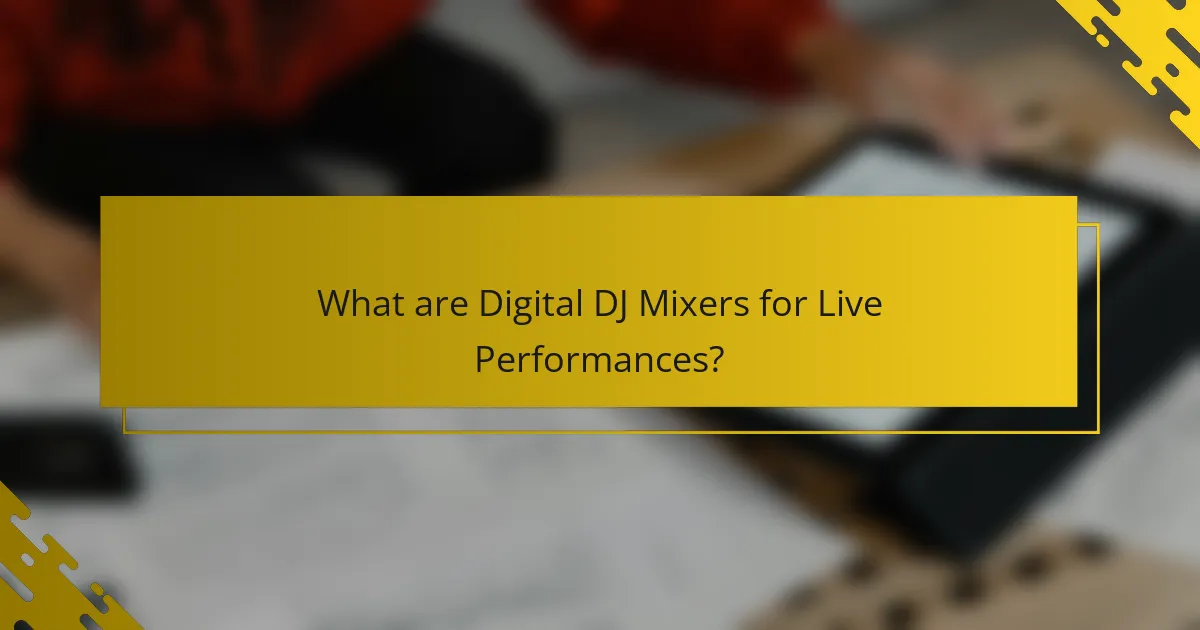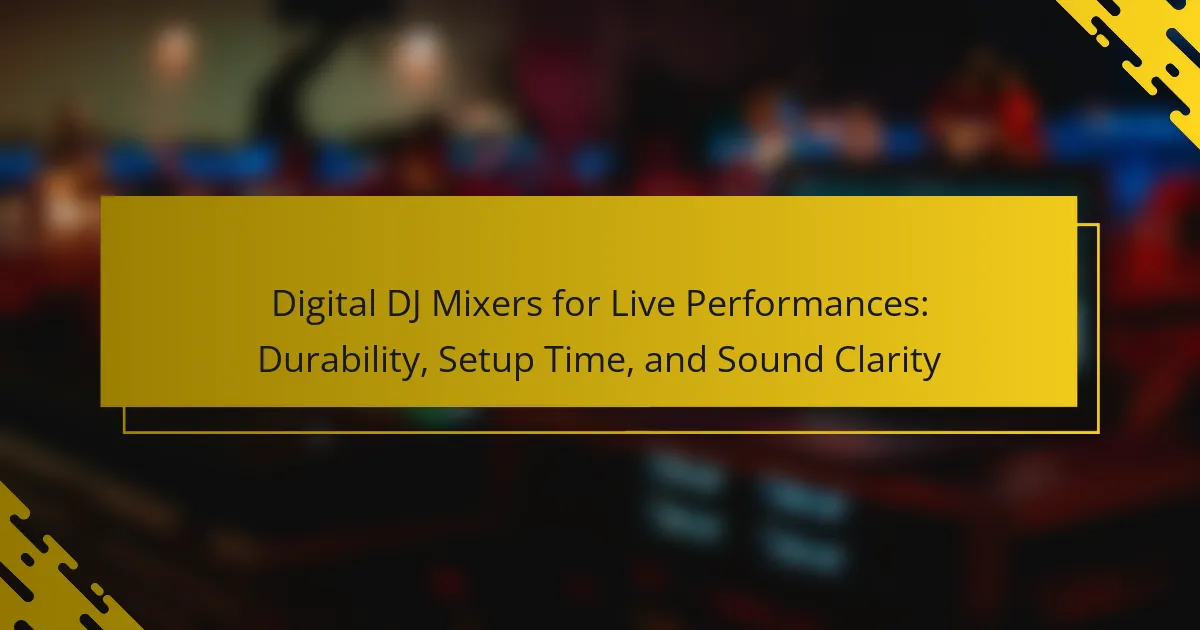Digital DJ mixers are electronic devices designed for live performances, enabling DJs to blend audio signals from various sources in real-time. This article provides an overview of the essential features of digital DJ mixers, including their multiple channels, volume controls, equalization options, and built-in effects processors. It also highlights the importance of USB connectivity and integrated sound cards for high-quality audio output. Additionally, the article addresses the durability of these mixers, their setup time, and the impact of digital technology on sound clarity during live events.

What are Digital DJ Mixers for Live Performances?
Digital DJ mixers for live performances are electronic devices used to blend audio signals from multiple sources. They allow DJs to manipulate sound in real-time during performances. These mixers typically feature multiple channels, each with volume controls and equalization options. They also include effects processors to enhance audio quality. Digital DJ mixers often support USB connectivity for direct integration with computers and software. Many models come equipped with built-in sound cards for high-quality audio output. Their versatility makes them essential for live music events and club settings. The adoption of digital technology has improved sound clarity and ease of use in live performances.
How do Digital DJ Mixers differ from traditional mixers?
Digital DJ mixers differ from traditional mixers primarily by their integration of digital technology. Digital DJ mixers use software to manipulate sound, while traditional mixers rely on analog circuitry. This digital integration allows for advanced features such as effects processing, looping, and beat matching. Digital mixers offer a more intuitive user interface, often with touchscreen controls. They also enable seamless integration with digital audio workstations (DAWs) and other software. Additionally, digital mixers can store and recall settings, which enhances performance efficiency. Traditional mixers, in contrast, require manual adjustments for each performance. The flexibility of digital mixers makes them preferable for live performances where adaptability is crucial.
What features define Digital DJ Mixers?
Digital DJ mixers are defined by their ability to blend audio signals from multiple sources. Key features include multiple input channels for connecting various devices. They often have built-in effects to enhance sound quality. Many digital mixers offer USB connectivity for easy integration with computers. A user-friendly interface allows DJs to manipulate sound intuitively. Additionally, they frequently include visual feedback through LED displays. Some models provide advanced routing options for flexible sound management. These features collectively enhance the live performance experience for DJs.
What role do Digital DJ Mixers play in live performances?
Digital DJ mixers serve as the central hub for audio manipulation during live performances. They allow DJs to mix multiple audio sources seamlessly. This includes blending tracks, adjusting volume levels, and applying effects in real-time. Digital DJ mixers enhance sound clarity by offering advanced equalization and filtering options. They also provide features like looping and sampling to enrich the performance. The integration of digital technology allows for precise control over audio output. Additionally, many mixers include built-in sound cards for direct connection to computers. This versatility makes them essential tools for modern DJs in live settings.
Why is durability important for Digital DJ Mixers?
Durability is important for digital DJ mixers because they are often used in dynamic and demanding environments. DJs frequently transport their equipment, exposing it to potential damage. A durable mixer withstands the rigors of travel and regular use. This resilience ensures consistent performance during live events. Additionally, durable mixers reduce the risk of malfunction, which can disrupt a performance. High-quality materials and construction enhance longevity. This reliability is crucial for maintaining a professional reputation. Ultimately, durability contributes to the overall success of live performances.
What materials contribute to the durability of Digital DJ Mixers?
Digital DJ mixers are made durable by using materials such as metal, high-grade plastics, and rubber. Metal chassis provide structural integrity and resistance to wear. High-grade plastics are used for lightweight components while maintaining strength. Rubber feet or pads enhance grip and reduce vibrations during use. These materials are often chosen for their ability to withstand the rigors of live performances. Their durability is essential for ensuring long-term functionality and reliability in various environments.
How does durability impact performance during live events?
Durability significantly impacts performance during live events by ensuring equipment can withstand the rigors of frequent use. High durability reduces the likelihood of equipment failure, which can disrupt a performance. For instance, digital DJ mixers designed with robust materials often last longer under intense conditions. This reliability allows DJs to focus on their set rather than worrying about technical issues. Studies show that equipment failures can lead to lost audience engagement and revenue. Durable mixers maintain sound clarity and functionality, contributing to a seamless live experience. In summary, durability is crucial for maintaining performance integrity in live events.
What factors influence setup time for Digital DJ Mixers?
The factors that influence setup time for Digital DJ Mixers include the complexity of the mixer, the number of connected devices, and the familiarity of the DJ with the equipment. A more complex mixer often requires additional configuration steps. The number of devices, such as laptops, microphones, and speakers, can increase setup time due to the need for proper connections. Familiarity with the equipment can significantly reduce setup time. DJs who regularly use the same setup can complete the process more quickly. Additionally, the availability of pre-saved settings can streamline the setup process. Environmental factors, such as space constraints and power availability, also play a role. Each of these factors can either extend or shorten the overall setup time for a performance.
How can users optimize their setup process?
Users can optimize their setup process by organizing their equipment before the event. This includes checking all connections and ensuring compatibility. Users should also create a checklist to ensure nothing is forgotten. Testing the setup in advance allows for troubleshooting potential issues. Utilizing labeled cables can speed up the connection process. Setting up in a familiar environment reduces setup time. According to a survey, organized setups can reduce setup time by up to 30%. This efficiency leads to a smoother performance experience.
What common challenges affect setup time?
Common challenges that affect setup time include equipment compatibility issues. Incompatibility can lead to delays in connecting devices. Another challenge is the complexity of the setup process itself. A complicated setup can require additional time for configuration. Additionally, inadequate space can hinder efficient setup. Limited space may restrict movement and access to equipment. Lastly, technical difficulties such as software glitches can arise. These issues can prolong the setup duration significantly. Each of these challenges can impact the overall efficiency of preparing for a live performance.
How does sound clarity affect live performances?
Sound clarity significantly enhances live performances by ensuring that the audience can hear every detail of the music. Clear sound allows performers to communicate their artistic expression effectively. It minimizes distortion and allows for a better balance between instruments and vocals. Research indicates that audiences respond more positively to performances with high sound clarity. A study published in the Journal of the Acoustical Society of America found that clarity directly influences audience enjoyment and engagement. Additionally, clear sound helps performers stay in sync with each other. This synchronization is crucial for maintaining the energy and flow of the performance. Overall, sound clarity plays a vital role in the overall success of live events.
What technologies enhance sound clarity in Digital DJ Mixers?
Digital DJ mixers enhance sound clarity through several key technologies. These include digital signal processing (DSP), high-quality audio converters, and noise reduction algorithms. DSP allows for real-time manipulation of audio signals, improving overall sound quality. High-quality audio converters ensure accurate sound reproduction, preserving detail and clarity. Noise reduction algorithms minimize unwanted background noise, enhancing the listening experience. Additionally, features like equalization and filtering help tailor sound frequencies for optimal clarity. These technologies collectively contribute to a more refined audio output in digital DJ mixers.
How can users maintain sound clarity during performances?
Users can maintain sound clarity during performances by using high-quality audio equipment. Selecting digital DJ mixers with advanced sound processing features is essential. Regularly checking and adjusting EQ settings helps to optimize sound quality. Ensuring proper microphone placement reduces feedback and enhances clarity. Utilizing soundproofing materials in the performance area minimizes external noise interference. Testing sound levels before the performance ensures optimal audio balance. Additionally, using a reliable sound check protocol can identify potential issues early. These practices contribute to a clear and professional audio experience during live performances.
What are the best practices for using Digital DJ Mixers in live settings?
To effectively use digital DJ mixers in live settings, ensure proper setup and sound checks. Start by organizing cables to prevent tangling and interference. Verify that all connections are secure before the performance begins. Use the mixer’s built-in effects judiciously to enhance sound without overwhelming the audience. Regularly monitor levels to avoid distortion and maintain audio clarity. Familiarize yourself with the mixer’s layout and features prior to the event. Practice transitions and cue points to ensure smooth performance. Lastly, always have backup equipment ready in case of technical failures. These practices enhance reliability and sound quality during live performances.
How can DJs troubleshoot common issues with Digital DJ Mixers?
DJs can troubleshoot common issues with digital DJ mixers by following a systematic approach. First, check all connections to ensure they are secure. Loose cables can cause sound interruptions. Next, verify that the mixer is powered on and that the power source is functioning. If there is no sound, adjust the volume levels and ensure the correct input is selected.
If the mixer exhibits audio distortion, inspect the EQ settings and adjust them to eliminate any feedback. For software-related issues, restart the mixer and any connected devices. Updating the firmware can resolve compatibility problems.
Lastly, refer to the user manual for specific troubleshooting steps related to the mixer model. This methodical approach helps DJs effectively address common issues.
What tips can improve overall performance with Digital DJ Mixers?
To improve overall performance with digital DJ mixers, ensure proper setup and calibration. Start by organizing your cables to prevent interference and signal loss. Use high-quality audio interfaces for better sound clarity. Regularly update the firmware of your mixer for optimal functionality. Familiarize yourself with the mixer’s features to utilize them effectively. Practice mixing in various environments to adapt to different acoustics. Monitor sound levels consistently to avoid distortion. Additionally, invest in quality headphones for accurate cueing. These practices enhance performance and reliability during live sets.
Digital DJ mixers for live performances are essential electronic devices that enable DJs to blend audio signals from multiple sources in real-time. This article explores the durability of these mixers, highlighting the materials that enhance their resilience and the impact of durability on live performance success. It also examines factors influencing setup time and offers strategies for optimizing the setup process. Additionally, the article discusses the importance of sound clarity in live events, technologies that enhance audio quality, and best practices for effective use of digital DJ mixers during performances.
